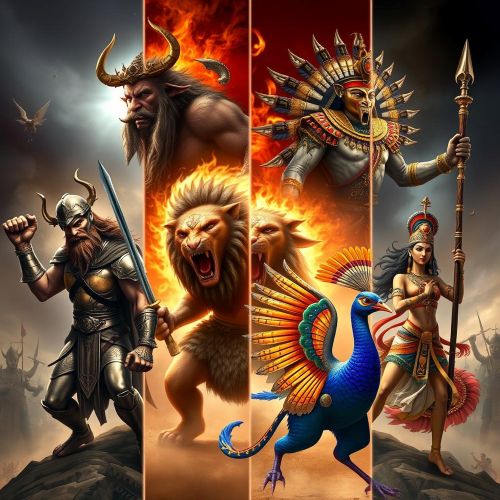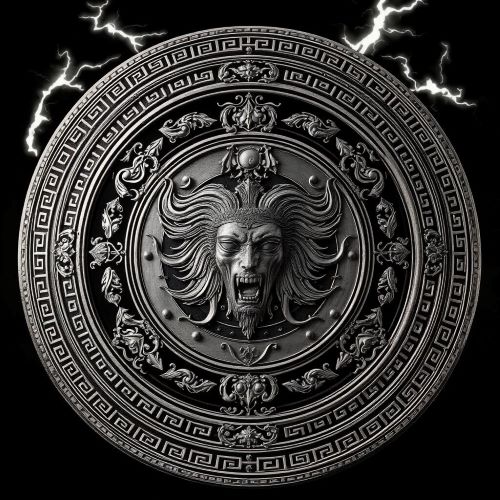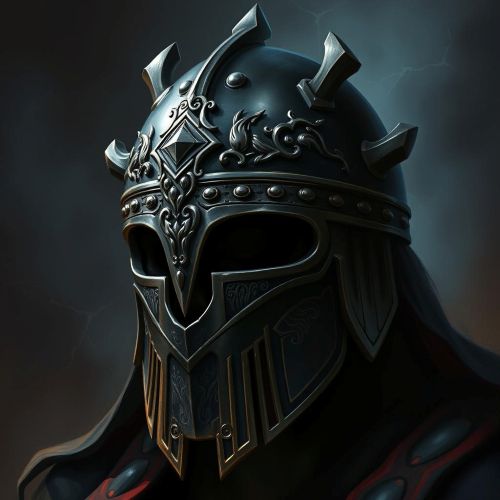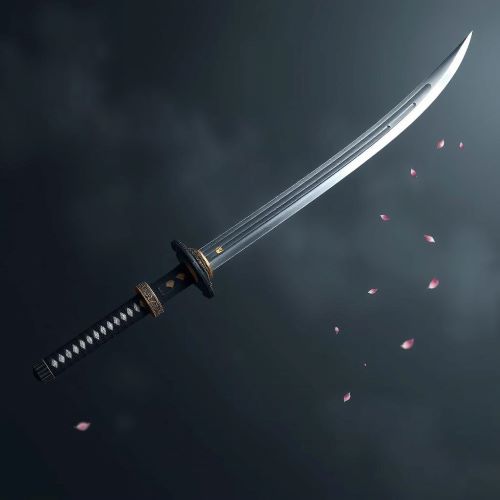Zeus’s Thunderbolt : The Mightiest One
Zeus’s Thunderbolt
Introduction
Origins
Zeus’s thunderbolt finds its origins in the epic Titanomachy, the legendary struggle between the Olympians and the Titans. To triumph over Cronus and his allies, Zeus freed the Cyclopes and Hecatoncheires from their Tartarus prison. In gratitude, the Cyclopes, renowned for their unmatched craftsmanship, forged the thunderbolt, imbuing it with the elemental force of lightning. Often associated with Hephaestus’s skill as a divine blacksmith, this weapon was far more than a destructive tool; it became a profound emblem of Zeus’s reign over the skies and his ability to command nature’s raw power. A cornerstone of Greek mythology, the thunderbolt also symbolizes justice and retribution, reflecting Zeus’s role as the ultimate arbiter in the divine order.
Think you know your myths and legends? Dive into the world of ancient stories and test your knowledge with our engaging quizzes on Mythlok!
Powers
Zeus’s thunderbolt stands as a testament to unmatched power and authority in Greek mythology. Capable of conjuring storms, lightning, and thunder, it was not only a weapon of unparalleled destruction but also a symbol of divine justice and moral order. With its ability to strike with pinpoint precision and catastrophic force, the thunderbolt could split mountains and reshape landscapes, demonstrating Zeus’s dominance over both the heavens and the earth.
Beyond its physical might, the thunderbolt represents Zeus’s role as the arbiter of cosmic and moral balance. Its presence reinforced his status as king of the gods, instilling awe and fear among mortals and immortals alike. The weapon was more than an instrument of punishment; it was an extension of Zeus himself, embodying his responsibility to uphold justice and suppress chaos.
The thunderbolt’s use in myth highlights the concept of divine retribution, where Zeus punished defiance, hubris, or actions that disrupted the natural order. It also reflects his ability to influence the natural world, with his moods and decisions manifesting as storms or other weather phenomena. This link between Zeus and the forces of nature underscores his deep connection to the elemental power he wielded.
As a force capable of altering the physical world, the thunderbolt symbolizes the profound impact of divine intervention. Its strikes could ignite fires, reshape terrain, and leave lasting marks on the earth, such as fulgurites. These transformations mirrored the far-reaching consequences of Zeus’s actions, showing how his decisions resonated across mortal and divine realms alike.
In essence, Zeus’s thunderbolt is a multifaceted emblem of raw power, justice, and cosmic order. It serves as a reminder of his immense authority and the delicate balance he maintained as both protector and enforcer of universal harmony. Through this iconic weapon, Zeus’s legacy as the supreme deity of the Greek pantheon endures, embodying the intertwined forces of nature and divinity.
Owners/Users
The thunderbolt is intrinsically tied to Zeus, serving as both his weapon and an enduring emblem of his unparalleled authority and divine rulership. Unlike other mythological weapons that may have shared users, the thunderbolt’s exclusivity reinforces its association with Zeus’s identity and his control over the natural and moral order.
While Zeus is its primary wielder, mythological accounts occasionally link the thunderbolt to other figures, though in significantly limited contexts. For instance, Asclepius, the god of healing, was struck by a thunderbolt as punishment for defying natural laws by resurrecting the dead. This act underscores the weapon’s role as an instrument of divine retribution and its connection to enforcing cosmic balance.
Rarely, other deities like Athena are depicted employing the thunderbolt on Zeus’s behalf, further emphasizing its role as a symbol of his overarching authority rather than a shared tool. These instances highlight the thunderbolt’s unique status as a manifestation of Zeus’s dominion and the ultimate arbiter of justice in Greek mythology.
Instances used
The thunderbolt has been pivotal in many iconic moments in Greek mythology, symbolizing Zeus’s unmatched power and role as the enforcer of cosmic balance. One of its earliest and most significant appearances was during the Titanomachy, the great war between the Olympian gods and the Titans. Zeus wielded the thunderbolt to overthrow Cronus and the other Titans, securing his supremacy and establishing himself as the king of gods and mortals.
In another legendary battle, Zeus faced Typhon, a fearsome giant born of Gaia and Tartarus. Typhon sought to overthrow the gods, but Zeus unleashed his thunderbolts in a relentless assault, ultimately defeating the monstrous adversary. This victory reaffirmed Zeus’s position as the ultimate ruler of the cosmos, with the thunderbolt as the definitive symbol of his invincibility.
The myth of Phaethon also features the thunderbolt prominently. When Phaethon, the son of Helios, attempted to drive his father’s sun chariot, he lost control, endangering both the earth and the heavens. To avert disaster, Zeus struck Phaethon down with a thunderbolt, demonstrating its role as a tool for preserving balance and curbing reckless behavior.
Another memorable use of the thunderbolt is seen in the tale of Salmoneus, a mortal who dared to mimic Zeus by creating artificial thunder and lightning to deceive others into worshiping him. In response, Zeus destroyed Salmoneus with a thunderbolt, serving as a stark warning against hubris and the imitation of divine power.
These instances not only highlight the thunderbolt’s immense destructive capability but also its deeper significance as a symbol of justice and order. Whether used in battle, punishment, or as a deterrent to chaos, the thunderbolt embodies the authority and cosmic responsibility of Zeus, ensuring the stability of both divine and mortal realms.
Frequently Asked Questions
Lorem ipsum dolor sit amet, consectetur adipiscing?
Lorem ipsum dolor sit amet, consectetur adipiscing elit. Praesent convallis vestibulum justo, ac tincidunt nunc vehicula quis. Nullam id dolor quis orci malesuada feugiat. Curabitur aliquet libero at urna ullamcorper, ac ultricies nulla dapibus.
Lorem ipsum dolor sit amet, consectetur adipiscing?
Lorem ipsum dolor sit amet, consectetur adipiscing elit. Praesent convallis vestibulum justo, ac tincidunt nunc vehicula quis. Nullam id dolor quis orci malesuada feugiat. Curabitur aliquet libero at urna ullamcorper, ac ultricies nulla dapibus.
Lorem ipsum dolor sit amet, consectetur adipiscing?
Lorem ipsum dolor sit amet, consectetur adipiscing elit. Praesent convallis vestibulum justo, ac tincidunt nunc vehicula quis. Nullam id dolor quis orci malesuada feugiat. Curabitur aliquet libero at urna ullamcorper, ac ultricies nulla dapibus.
Lorem ipsum dolor sit amet, consectetur adipiscing?
Lorem ipsum dolor sit amet, consectetur adipiscing elit. Praesent convallis vestibulum justo, ac tincidunt nunc vehicula quis. Nullam id dolor quis orci malesuada feugiat. Curabitur aliquet libero at urna ullamcorper, ac ultricies nulla dapibus.
Lorem ipsum dolor sit amet, consectetur adipiscing?
Lorem ipsum dolor sit amet, consectetur adipiscing elit. Praesent convallis vestibulum justo, ac tincidunt nunc vehicula quis. Nullam id dolor quis orci malesuada feugiat. Curabitur aliquet libero at urna ullamcorper, ac ultricies nulla dapibus.
Watch
Source
Hesiod. “Theogony.” Translated by Hugh G. Evelyn-White. Harvard University Press, 1914.
Apollodorus. “The Library of Greek Mythology.” Translated by Robin Hard. Oxford University Press, 1997.
Gantz, Timothy. “Early Greek Myth: A Guide to Literary and Artistic Sources.” Johns Hopkins University Press, 1993.
Graves, Robert. “The Greek Myths.” Penguin Books, 1955.
Myth and Folklore Wiki. “Thunderbolt (Greek mythology).” Fandom. Retrieved from https://mythus.fandom.com/wiki/Thunderbolt_(Greek_mythology)
Greek Boston. “Get to Know Zeus’s Lightening Bolt.” 2021. Retrieved from https://www.greekboston.com/culture/mythology/zeus-lightening-bolt/
Sirioti. “The Thunderbolt of Zeus: The Power and Symbolism of the King of the Gods.” Retrieved from https://sirioti.com/blogs/greek-symbols-meaning/the-thunderbolt-of-zeus-the-power-and-symbolism-of-the-king-of-the-gods-weapon
Greek Myth Wikia. “Lightning Bolt.” Retrieved from https://greek-myth.fandom.com/wiki/Lightning_Bolt











